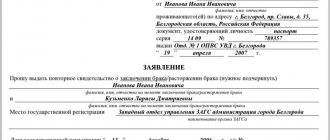Basic information
Usually a marriage with a prisoner is registered in order to make it easier and faster to receive visits. In addition, the remaining spouse receives the legal right not to testify against the accused, since the latter will become his close relative.
The law allows for marriages to take place outside the place of registration. After the procedure, you can obtain permission for a long visit - 1-3 days in a separate room. You need to take personal hygiene products, food, bed linen, and change of clothes with you.
An accelerated procedure for registering a marriage without the consent of the colony authorities is not available. If on the planned wedding date a prisoner is transferred to a punishment cell due to a disciplinary offense, the event will be postponed.
You will not be able to use the government services portal and other government Internet services.
Our experts know the answer to your question
Do you want to solve your problem? Consult our lawyer for free the form or numbers :
- Moscow ext. 143
- St. Petersburg ext. 702
- RF ext. 684
Results
If the parties decide to formalize a civil marriage, and one of the parties is a contracted one, it is possible to do this. Here it is important to start the registration process in advance, have instructions for action at hand and gradually implement all the steps. We must not forget about the need to issue a pass at the MLS, decide on the registry office, prison rules and the place where the event will be registered. If any difficulties arise in this matter, you can always contact a lawyer with your question and receive detailed instructions for action.
Required documents
These include the following:
- application for registration of a marital union;
- passports of future spouses;
- a certificate of dissolution of the marital union, if previously one of the couple was already in an official relationship;
- temporary registration, payment receipts for a hotel room - if a person comes from another region for more than 3 days;
- written permission to register a marriage from the administrative authorities of the city (if one of the couple is a minor);
- documents with a notarized translation, if a marriage between representatives of two different states is being celebrated in prison;
- receipt of payment of the state duty (its amount is 350 rubles ).
The state duty is paid at the bank. An employee of the institution will issue a receipt, which will need to be presented to the head of the colony or pre-trial detention center. Most often you have to contact a city bank, since the colonies are located far from large populated areas, and there are usually no bank branches nearby.
An application for marriage registration is drawn up using a special form No. 7. It will need to reflect the following information:
- civil registry office and full name of the applicants;
- an indication of the voluntary nature of the decision, the absence of circumstances for refusal to carry out the procedure;
- information about persons entering into marriage: full name, date of birth, age at the time of the union, citizenship, nationality, place of residence, passport details;
- request to register the marriage, assign the specified surname to the husband or wife;
- signatures, date.
You can download a ready-made form for registering a marriage with a prisoner using this link.
Registration of marriage in a pre-trial detention center
The only place where you can officially get married is the registry office (Article 10, Part 1 of the RF IC). However, citizens who are under investigation, convicted and serving a sentence in prison or penal colony do not have the opportunity to appear in person at the registry office. Although they are not deprived of the right to start a family.
The law allows you to marry a prisoner in a pre-trial detention center, regardless of who is under investigation - the groom or the bride. Official registration takes place in the pre-trial detention center.
The procedure for registering a family union in a pre-trial detention center is fully consistent with the general provisions of the Family Code. The procedure is carried out strictly in the presence of the bride and groom. There can be no exceptions involving a third party to represent one of the parties by proxy.
Differences from registration in other places
The marriage procedure is always the same. It is carried out in a room on the territory of the pre-trial detention center or colony where the convicted person is serving his sentence. To get married in a pre-trial detention center, you need to contact the investigator in charge of the case or the judge. If the future spouse is in a colony, they write an application addressed to the head of the penal colony.
The newlyweds will have to do without a formal registration with flowers and champagne. Guests will also not be allowed to be invited to the pre-trial detention center. If the wedding is in a zone, the administration may allow no more than 2 people from one newlywed couple to be invited.
The exception is citizens who are serving their sentences in a penal colony. They have the right to visit the registry office in person to get married, since during the day they are outside the correctional facility, working in the city or town. The newlyweds also have the opportunity to invite guests and even modestly celebrate the event at a local club. But this condition is discussed with management and decided strictly on an individual basis.
If the spouses decide to register in the colony, they will receive the right to a long (3 days) visit. If one of the spouses is in a pre-trial detention center, then this is impossible; visits can only be obtained after a verdict has been passed.
After completion of the procedure, the marriage is considered concluded, and the newly minted spouses have rights and obligations set forth in the Family Code. Although it is possible to marry a prisoner, the husband and wife will not be able to live together until the end of their sentence.
Reasons for getting married in a pre-trial detention center
The reasons that motivate you to marry a prisoner in a pre-trial detention center are not always romantic. In most cases, people decide to sign if:
- A woman is pregnant and wants the child to be born in an official marriage.
- You need to get married to settle inheritance matters.
- It is necessary to secure the legal basis for ownership of property.
- Get the legal opportunity not to testify against your husband or wife.
- Obtain the right to short and long visits with a prisoner in a colony. “Common-law” spouses are often denied this right, but official spouses can meet from 2 to 6 times a year, depending on the prison regime.
A wedding does not give you the right to receive parole. A prisoner should not count on a lighter regime or receiving any other bonuses.
If the application is submitted by someone who is free
If a person who is free expresses a desire to register his relationship with a prisoner, then he needs to contact the registry office that is territorially related to the area where the colony is located. There you need to receive an application form and a receipt for payment of the fee.
Next, you need to fill out one part of the application and pay the fee. The next stage is searching for a notary who will agree to travel to the colony (this service can cost from 2 to 10 thousand rubles).
The notary must obtain permission to visit the correctional facility, where the prisoner must fill out his part of the application. The completed form and receipt of payment of the fee must be taken to the registry office, where the registration date will be set.
No later than 5 days in advance, you should contact the colony administration (or the investigator, if the future newlywed is in a pre-trial detention center) to obtain permission for the ceremony. On the appointed day, you need to order transport to take the registry office employee to the place and take you back. After the newlyweds receive the certificate, the marriage is concluded.
If the initiator of the marriage is a prisoner
With the question of whether he can get married in prison, the prisoner turns to the administration of the correctional institution or to the investigator if he is in a pre-trial detention center. If the future newlywed is not in isolation and does not have a large number of disciplinary sanctions, then he will be given an application form.
The administration invites a notary, in whose presence the prisoner fills out his part of the application. Next, you need to pay the state fee and notary services (these costs fall on the shoulders of the future spouses).
A half-completed application is handed over by the administration to the person with whom the prisoner wishes to marry. He is also informed which branch of the registry office he needs to submit documents to. The second party fills out their part of the application and brings it to the registry office. There they set a registration date (usually in 1 month). During this time, the future newlywed, who is free, must have time to obtain permission from the investigator or the administration of the colony to visit the place of detention on the day of registration.
Features of the procedure
First of all, the convicted person fills out his part of the marriage application in the presence of an employee of the notary agency. Then the notary certifies the document and transfers the application to the second spouse. The latter can contact the registry office to obtain a form in his name. Sometimes the form is issued directly by the head of the colony.
The marriage registration procedure is carried out in a separate room within the pre-trial detention center or prison. The previously unconvicted spouse and the notary must issue a pass in order for the guards to let them through.
The duration of the procedure is no more than 30 minutes . You cannot carry rings or other metal objects with you.
The maximum number of guests during the wedding procedure is 2 people . They will need to obtain special written permissions granting the right to attend the event.
Registration procedure
How to register a marriage with a prisoner? The registration itself is carried out by a civil registry office employee who goes to a colony, prison or pre-trial detention center. The marriage takes place on the territory of the institution, so the second future spouse, who is free, must take care in advance of permission to visit and obtain a pass. According to the law, the wedding takes place a month after the application is submitted, but the specific time will depend on the workload of the registry office.
Then the registration itself takes place on the territory of the pre-trial detention center or correctional institution. The premises for it are determined by the administration; usually no ceremonies are held. You can exchange rings, but after the wedding the “free” spouse will have to take both rings with him: as a rule, wearing jewelry is not allowed in pre-trial detention centers or colonies.
However, after the wedding, the newlyweds can be granted a long visit (if, of course, a corresponding application has been submitted to the colony administration in the prescribed manner) - so at least you can count on the first wedding night. But if the bride or groom was in a pre-trial detention center, alas, this will not happen: such visits are available only to those already convicted, and not to those under investigation.
Features of the procedure
The procedure for registering marriage relations can be carried out:
- before trial;
- when the accused is on trial;
- at the end of the trial before being sent to prison or during the period after filing an appeal.
The actions that need to be taken to organize the legalization of communication are practically the same. The only difference is that, depending on the time of the marriage registration procedure, it is necessary to apply for permission to confirm the legality of the marriage from different officials.
Regardless of whether cohabitants wish to sign before the trial, during the trial or after the trial, their actions fall under paragraph 2 of Art. 26 of Law N 143-FZ “On acts of civil status”. The law states that if one of the persons is unable to jointly write statements at the registry office, it is allowed to submit separate applications to enter into an official union.
How is a wedding in prison?
On the day of registration, you arrive, where the marriage is registered. You and the registry office employee are inspected and given a pass to the territory of the correctional institution.
Most likely, only you will be at your own wedding. Not counting the registrar of the registry office and several employees of the colony. Only in rare establishments do bosses allow a couple to invite two guests. But most often, unauthorized persons are prohibited from attending the registration of marriage in the correctional institution.
There is no formal ceremony. You will put the necessary signatures in the registration log. You will even be allowed to exchange rings. But after that you will take them with you - wearing metal products in prisons is prohibited (according to internal regulations). The entire wedding procession will take about five minutes. Your spouse will be taken away immediately.
After the wedding, the newlyweds will be “gifted” with a long visit (except for those sitting in a pre-trial detention center - visits are available to persons after a court verdict). It will last up to three days. True, for this you need to obtain permission to date in advance.
Is there a solemn ceremony everywhere?
Such a process is possible in the most ideal dreams. Not everyone is allowed special clothes and long dates, and the rings are made of metal, and such products are not supposed to be taken into a closed area.
Ceremonial music, photographers and alcohol, even a glass of champagne, will not be allowed. The bride and groom can drop into the designated room for 5 minutes and quickly return to work. This is just enough time to sign the agreement.
Visit of a notary to a pre-trial detention center: why is it necessary?
There is no other way for a person under investigation to file a statement, since a person suspected of a crime will not be released from a pre-trial detention center.
The notary's signature and seal on the statement of desire to get married, written by the convicted person, confirms that the document contains genuine information.
A notary can be public or private. The main thing is that he has a valid license to work.
Additional nuances
- If an employee has registered a marriage with a prisoner, the employer does not have the right to dismiss him on this basis - this is prohibited by the legislation of the Russian Federation. It is also not necessary to inform the employer about the planned registration of marriage - he may not even find out about anything if you do not change your last name and passport. To get married, it is enough to ask for a week's leave at personal expense.
- At the same time, managers often check all relatives of the applicant for criminal records. In order not to face punishment, the director can report that the applicant for the position does not have sufficient skills and experience. It will not be possible to hold him accountable. For this reason, it should be borne in mind that registering a marriage for convicted persons denies access to public service and banks. This can also negatively affect the future lives of their common children.
- As for property rights, standard legal norms apply. Thus, if the property was acquired before the marriage was registered, the convicted person does not have the right to claim it after his release. If a prisoner transfers money from his salary to his spouse, and the latter then acquires property, then it is considered jointly acquired property and is subject to division during a divorce.
- If the marriage took place in prison, then it will no longer be possible to divorce a person serving a sentence using a simplified procedure. You will need to go to court, providing a marriage certificate, passports, a receipt for payment of the state fee and a photocopy of the verdict, certified by the signature and seal of the judge.
Possible problems and nuances
Despite the fact that you can get married in prison, as well as in freedom, you need to take into account the legal and social consequences of such a marriage for a free spouse.
Consequences of marrying a prisoner
Of course, most of the consequences of such an alliance come down to people’s prejudices, that is, they are of a social nature. But we must not forget about a number of legal consequences:
- The personnel policies of many large companies prohibit hiring relatives of prisoners. This is how the security service tries to protect the company from potential fraud and other crimes.
- After entering into such a marriage, it will not be possible to build or continue a career as a judge, investigator and prosecutor.
- You will not be able to get a job in educational institutions.
- It may be difficult to obtain visas from many countries.
- Danger of facing marriage fraud. While one spouse is in prison, the other works and acquires some property. After the spouse is released, he can file for divorce and demand division of property.
It must be taken into account that many prisoners, even after their release, retain bad habits and a high level of aggression. As a result, situations of domestic violence, alcohol abuse and relapse into criminal activity are common.
Dismissal after marriage
There are often cases where correctional officers have affairs with prisoners. If such an affair develops into marriage, then according to the law this does not threaten the work of this employee. They cannot fire him, but the marriage still requires the approval of the colony leadership.
In a situation where the prisoner is in another prison, an employee of the Federal Penitentiary Service may not advertise the fact of the marriage at the place of work at all. To do this, you need to hold the ceremony while on vacation (or taking a vacation at your own expense) and not change your last name when registering, and also not enter information about marriage in your passport.
Let's sum it up
Thus, registering a marriage with a convicted person is associated with organizational difficulties and possible problems with employment for close relatives of the prisoner, including children. Often you have to take leave at your own expense, asking your employer for time off. The event lasts 30 minutes, the maximum number of guests is up to 2 people, the permissible duration of dates is no more than 3 days after the marriage is registered.
Otherwise, the procedure is not much different from registering the marriage of free people. It is necessary to fill out an application and prepare the required package of documents.
Share with your friends:









